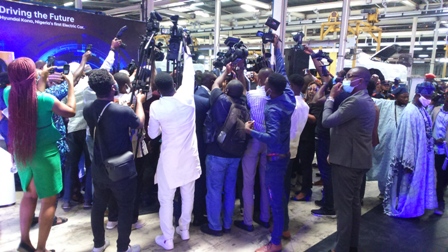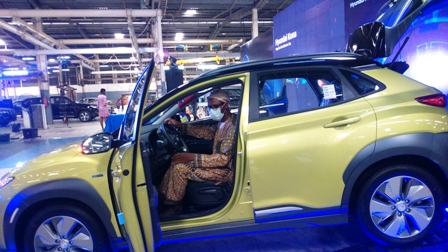…Promises Completion Of Lagos-Badagry Express Road
ROTIMI ASHER
Nigeria’s first locally assembled electric Vehicle (EV), Hyundai Kona, has been launched.The Governor of Lagos state, Babajide Sanwo-Olu, on Friday, unveiled the car at Stallion Group’s assembly plant (VON) located at Ojo, Lagos.
Accompanied by senior government functionaries, Sanwo-olu commended Stallion Group for bringing 21st Century automotive technology to the country. As a support to the company’s initiative, the governor pledged to facilitate establishment of EV charging points across Lagos metropolis.
He said:“Technology is the future. And with Hyundai Kona electric launch, Stallion has brought the future here. We as a government, therefore, need to partner with them.

“The state government shall collaborate with Ibile Oil and Gas and other private organisations to create charging locations in the state so that by the time you roll out the car in large quantity, EV owners will have places to charge them.”
Sanwo-olu appreciated the company for reviving the once moribund VON Assembly plant, promising that his administration would, in return, create an enabling environment for the company to achieve its set goals.
“For Lagos and Nigeria, this day is significant, because we are having an Electric car launch on a premises with about 50 years of history. I give kudos to Stallion Group for turning around the moribund facility.

“And I promise that this government shall support the company with an enabling environment to aid its success. This will include completion of the Lagos-Badagry Express road. Before we started from Orile, it was a two-lane road. As you can see, it is now 10-lane, which is why it seems to be taking a bit long. This time, we are doing something that would last for 40, 50 years.
“As a government, we commend Stallion for believing in Nigerian and Lagos dream.
”And as Stallion believes in Lagos, we see the future of Stallion. Thank you for coming back to this location. We as a government will not leave you alone. We will provide good infrastructure to help what you are doing.”
In his welcome speech the managing director of Stallion VON, Mr. Manish Rohtagi appreciated the government for always being forward thinking for the greater good of Lagos and encouraging sustainable means of operations, making the state future ready.

He said: “The Lagos State government’s advocacy for the first locally assembled electric car in this plant further adds to the vision for a greener and Eco-friendly Lagos.“
In his presentation at the occasion, the brand head Mr. Gaurav Vasisht described Hyundai Kona as a stepping stone towards a greener Lagos.
He stressed: “The question often asked is are we ready for Electric Vehicle in Nigeria? I am asking: Who says we are not ready?
“Making it affordable and accessible will see most Nigerians adopt the new normal in today’s time. It will be great to simply charge my car at home like a mobile phone and drive around at no fuel cost.
Kona offers just that ease to the consumers. The first electric SUV from Hyundai, the Kona, can go up to a range of 482 km with an acceleration of (0-100kms) in 9.7 seconds on a single battery cycle of a capacity of 64 KWH.
“The ease of charging is unmatched and can be plugged in at home or work for 9.35 hours for a full battery. It is 100% electric with zero carbon emission. KONA Electric is here to change the way people think about going electric.”

Global interest in climate change and its effects on the environment and society more broadly, is at an all-time high. Specifically, with the unpredictable pandemic of COVID-19, more countries are increasingly acknowledging the shift that’s needed from a fossil fuel-driven economy to one that is sustainable, green and attempts to mitigate climate change.
According to Hyundai Motors Nigeria, it is in recognition of this paradigm shift in the transportation sector that motivated the automaker to introduce Electric mobility.
And, not being discouraged by the infrastructural challenges in a developing country like Nigeria, Stallion embarked on the urgently needed attitudinal change for a clean environment by, in conjugation with Hyundai, launching the first ever Electric Vehicle in the county.
Running Costs
Another factor that will grease Kona’s wheel of success in the country is the car’s running cost, which is quite minimal. That will be more so in Nigeria, where electricity consumers resident in accommodation categorized under R1 are charged only N45 per kilowatt.
That implies Hyundai Kona owners would incur only N3300 for a full charge that will do a running of 482 kms, if he or she plugs the car into public power supply. The charging is also as simple as getting your mobile plugged in at your home or office electrical socket.

The ease of charging is unmatched and can be plugged in at home or work for 9.35 hours for a full battery charge and the power consumption for full charging is 143 WH/KM (68.926 kwh for 482km).
Besides the Hyundai Kona’s electric power-packed performance for providing a thrilling driving experience, it also manages to excel with its charging kit capacity of 2.3KW, with a voltage of 230V and frequency of 50Hz.
The styling of the vehicle is conventional, the interior is luxurious, and the ride is nearly silent.
Kona electric has been extensively applauded for its class driving range, safety convenience features and fast-charging capability. Its success can be measured by the following;
In April 2020, it was named the Best Small Family Car by the inaugural TopGear Electric Awards based on its 24-hour (1,600-km) performance. This year, U.S. News & World Report named it the Best Electric Vehicle.

WardsAuto included KONA Electric on its 10 best engines list. In 2018, Auto Express named it the Affordable Electric Car of the Year. The EV also played a role in the KONA‘s nameplate winning Spanish newspaper ABC’s Best Car of the Year award.
It also won the 2019 North American Utility Vehicle of the Year.
While EVs may have had a chequered past, there is still a unanimity among auto industry leaders and analysts that a tipping point is approaching where mass adoption will become inevitable. These factors have come together to force the traditional industry to take electrification seriously — faster than we had previously expected.
©Copyright MOTORING WORLD INTERNATIONAL.
All rights reserved. Materials, photographs, illustrations and other digital content on this website, may not be reproduced, published, broadcast, rewritten or redistributed in whole or in part without prior written permission from Motoring World International
Contact: [email protected]



